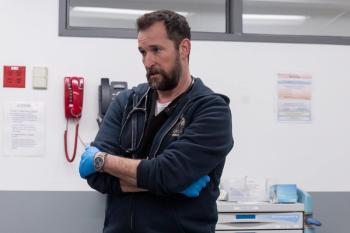
Why the Lorna Breen Act is just a first step to improving mental health in healthcare
Dr. Lorna Breen died by suicide early in the COVID-19 pandemic. A foundation formed in her honor helped craft federal legislation to help healthcare workers, and it is just getting started.
The mental health of doctors and nurses has been ignored for years, but it’s about to be the focus of a new federal law.
President Joe Biden is expected to sign the
The bill honors Dr. Lorna Breen, a doctor who died by suicide after being ovewhlemed by the trauma of treating COVID-19 patients early in the pandemic. Corey Feist and Jennifer Breen Feist, Breen’s sister, founded the Dr. Lorna Breen Heroes Foundation, which helped build support for the legislation.
Corey Feist told Chief Healthcare Executive that passage of the bill is “an incredibly important step.” Still, Feist said the foundation’s work is just beginning.
“We are hearing how important this moment is,” Feist said in a phone interview Thursday. “This has to be more than a moment. This has to truly be a movement toward addressing the healthcare needs of the workforce.”
Feist, a longtime healthcare executive, said the time has come to change the conversation around mental health.
“Our foundation was created in response to the needs of the healthcare workforce after my sister-in-law died by suicide and the needs the healthcare workforce expressed to us,” Feist said. “We continue to feel very strongly this is an incredible first step recognizing to the workforce they are heard and seen and embraced for the sacrifice they make on a daily basis.”
Gerald Harmon, president of the American Medical Association, talked about the importance of the legislation in a forum with the National Press Club Thursday. He said it will spur more doctors and nurses to get help.
“This type of action is long overdue,” Harmon said.
With the legislation on the cusp of becoming law, the foundation will now focus on “awareness, advocacy, and advancing solutions,” Feist said.
The work involves public education campaigns, pressing for more reforms at the federal and state levels, and pushing healthcare organizations to take steps to take care of their workers.
The Lorna Breen Act includes a three-year study which Feist said will serve as a roadmap to future legislation. The foundation also looks to change state licensing laws, which often ask unnecessary questions about mental health.
“We are just beginning this policy conversation,” Feist said.
‘This is armageddon’
An emergency department physician in New York City, Breen died by suicide on April 26, 2020 after driving herself beyond the point of exhaustion caring for COVID-19 patients. She became infected herself, but then returned to work on her first day without a fever and resumed working 12- to 15-hour shifts, Feist said.
Overwhelmed and still recovering from the virus, Breen lost her ability to cope. Even her years of experience as an emergency doctor in Manhattan couldn’t possibly have prepared her for the trauma and death she saw in the early stages of the pandemic. She witnessed more death in a week than she had in her entire career, Feist said.
At one point, Feist recalled Breen saying, “This is armageddon.”
The foundation is aiming to make sure other doctors and healthcare workers know they can - and must - get the help they need.
Overcoming myths
The COVID-19 pandemic has taken a serious toll on healthcare workers. A
But the pandemic isn’t the only burden taxing healthcare workers. In fact, a
“It’s the bureaucracy that continues to burn them out,” Feist said.
The Lorna Breen Act will help promote educational efforts to help healthcare workers see the importance of taking care of their mental health needs.
“That is something that does not come naturally to the healthcare workforce that is wired to help others first,” Feist said.
Crucially, Feist said the campaign will involve helping healthcare workers learn what regulations require regarding disclosures of mental health.
“We've got to let the workforce know what the actual rules are compared to myths,” Feist said. He said the misunderstanding played a part in Breen’s death.
“She was convinced she was going to lose her medical license in New York state for getting mental health treatment one time,” Feist said. “She was so convinced we could not move her off of it. And she was incorrect about it.” New York actually has good protections for doctors who seek mental health treatment, he said.
Many people don’t know the rules in their own state, so Feist said an education campaign is critical and it should be done at every hospital. “That information has life-saving potential,” Feist said.
Confronting stigma
Some, including the Joint Commission, have urged healthcare organizations to stop asking questions about the mental health history of clinicians. The American Medical Association and the Federation of State Medical Boards have said questions should be limited to conditions that could affect the clinicians’ abilities to perform.
The healthcare industry must recognize that too many doctors and nurses don’t seek mental health treatment because they are worried about the stigma that comes from seeking help. A
Feist said he regularly hears from healthcare workers worried about losing their license or that they will lose the respect of colleagues for taking a break.
“It is absolutely critical we use that campaign for the awareness effort, but also to work on this cultural stigma, which will carry the day in someone’s decisions about when they will get help or not,” Feist said.
The Medscape survey found many doctors don’t seek help because they don’t want to alert their licensing boards, or are wary of being shunned by colleagues. Some don’t want it on their insurance records.
What leaders can do
Healthcare organizations must do more to safeguard the health of their workers, Feist said.
Doctors and nurses are overworked due to staffing shortages. With limited staff, clinicians are less able or willing to take a break. Some fear burdening colleagues who are overworked. Healthcare organizations must find ways to provide better staffing, Feist said.
A nurse recently told Feist, “You want me to go to a therapist? I can’t get 30 minutes for lunch.”
Healthcare leaders - and the industry as a whole - must make the connection between the mental health of their doctors and nurses to the quality of patient care.
“Not engaging in self-care is going to impact patient care,” he said.
The foundation is engaged in another campaign, “
These steps include:
- Adjusting expectations and giving flexibility to find documentation that can be paused;
- Removing low-value work, including unnecessary training or in-box notifications;
- Addressing staffing, even if it means re-deploying non-clinical workers or having executives help out;
- Designating a well-being executive to manage clinician wellness efforts;
- Providing mental health counseling, peer support and psychological training for leaders.
Healthcare leaders need to understand the root causes of the stress on their workforce and show they are committed to finding remedies, Feist said.
“The workforce needs leaders to acknowledge the sacrifices they made and see them as people who need their support now more than they’ve ever needed them before,” Feist said.
If you're struggling or someone you know is struggling, help is available through the National Suicide Prevention Hotline. Call 800-273-TALK (8255). The hotline is available around the clock.





























































































